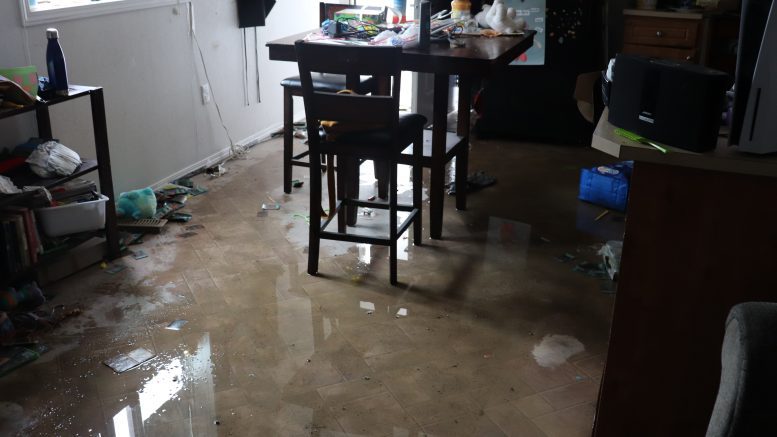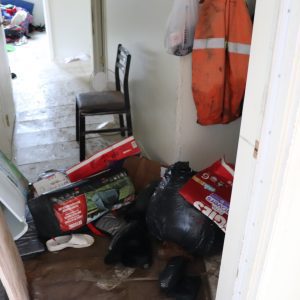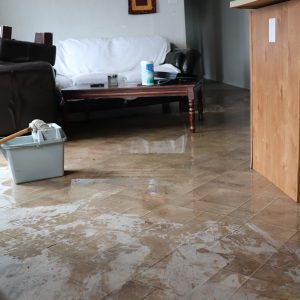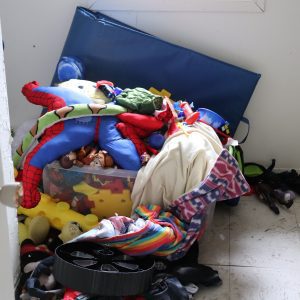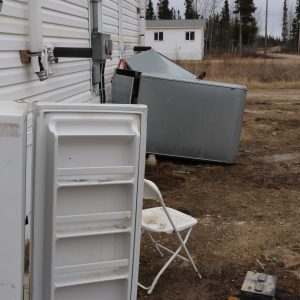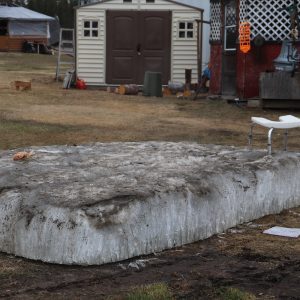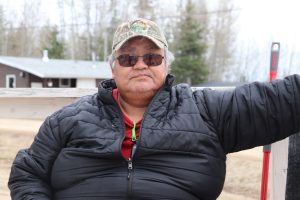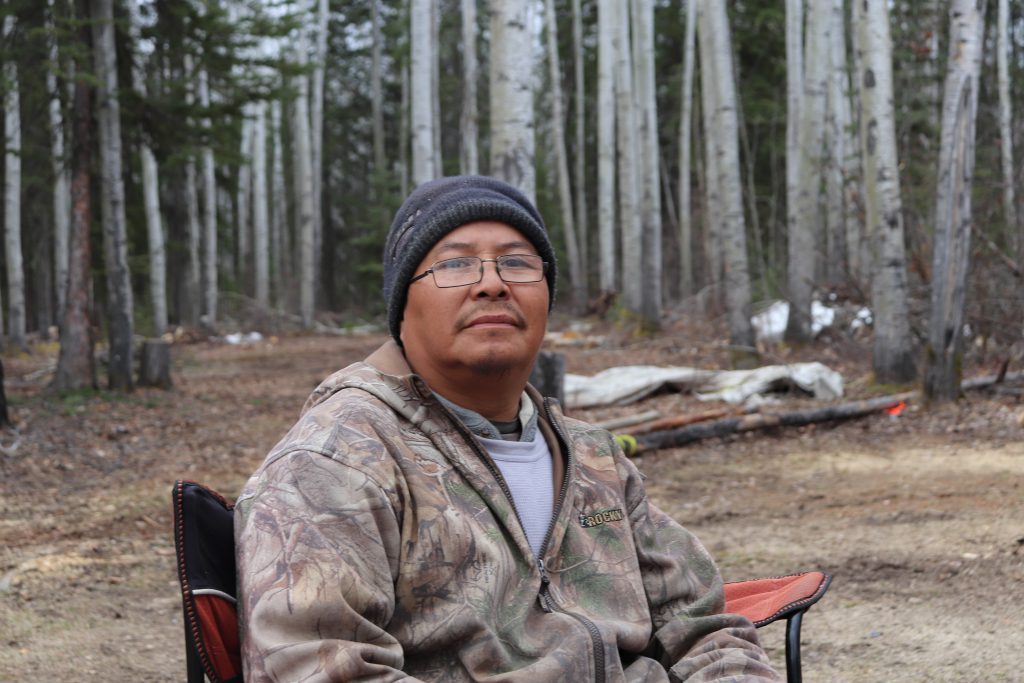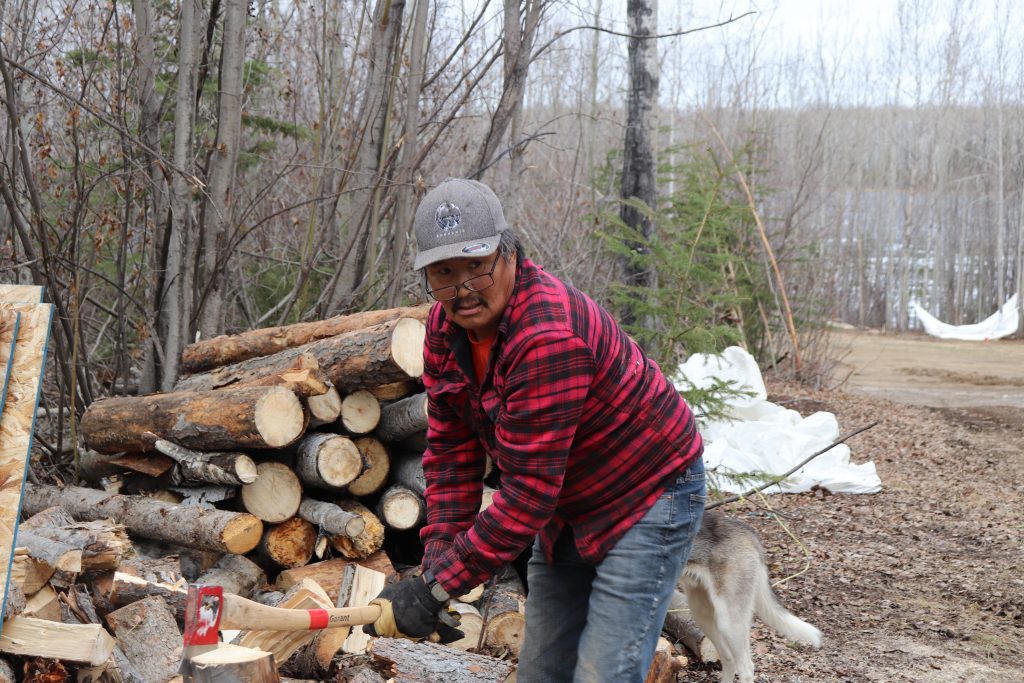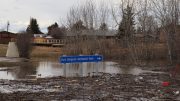The community of TthedzehK’edeli First Nation (Jean Marie River) is awaiting the territorial and federal government to decide its fate as much as it awaits mother nature to make its next move.
“The houses towards the airport… have to be totally replaced,” says Chief Stanley Sanguez.
The water line on one house stands over six-feet-tall. The smell of sewage and oil is overwhelming in many homes, fridges and freezers litter the front yards, mattresses lay soaked in bedrooms, while children’s toys are scattered on the floor — a sad reminder of happier times.
And there’s still the possibility of more flooding.
- The water rose so high it was left in the cutlery drawer of one house. (Photo by Luke Carroll/ CKLB.)
- Flooding left large pieces of ice strewn around town. (Luke Carroll/CKLB)
It’s not just the homes that are damaged, nearly all the community buildings including the nursing station and band office will need serious repairs as well.
On Friday afternoon Minister of Infrastructure Diane Archie arrived to see the level of destruction — she left looking visibly distressed.
The territorial government has said it would match a United Way donation of $150,000 for flooding victims, but there are no details on community-specific aid.
In the meantime those that call Jean Marie River home wait, like Melanie Norwegian.
She says she hopes the GNWT will put its money where its mouth is and provide all the funding the community is desperately in need of.
“A lot of people have been affected and a lot of people are trying to keep their spirits up,” she says.
Norwegian says she feels abandoned by the federal government, who has yet to step in while her many friends and family are now homeless.
(In another interview with CKLB, MP Michael McLeod said the GNWT told the federal government it had the situation under control.)
“Everybody today needs to start praying, because this is a wakeup call for us,” she says.
The risk remains high
Chief Sanguez is asking community members to stay away for the time being, as the risk of more flooding remains high.
“We’re still cautious because we don’t know what the ice condition is,” he explains.
Sanguez says they are asking for only essential workers to be in the community to help with cleanup.
On Friday afternoon, workers were out clearing deep freezers from rotting meat and other food.
When the flooding first hit, many Elders didn’t want to leave their lifelong homes.
“Some of the family members don’t want to leave,” Chief Sanguez says. “But what can you do if people want to stay? They stay.”
One Elder who was refusing to leave required a wheelchair and was unable to leave her house after the destruction of the flooding.
But Chief Sanguez says she is now safe at the Snowshoe Inn in Fort Providence along with many other residents.
A destructive spring in the Deh Cho
Chief Sanguez says seeing his community members suffer has been difficult for him emotionally.
“When the flood came in… everybody was heartbroken,” he says. “All I could do was cry… I don’t know what else to do.”
Now he is not only crying for his own community.
Fort Simpson is also dealing with extreme flooding that has displaced 700 residents from the island in the community.
Connie Villeneuve, who is displaced from her home in Jean Marie River, says her thoughts are prayers are with the people of Fort Simpson.
Chief Sanguez says the two communities have always had a strong relationship.
“The Dehcho First Nations have always been helpful to each other,” he says. “When we got flooded out, everybody cried for here and now we’re crying for Fort Simpson.”
The donation committee
But he says he is touched by the generosity his community has received from across the North. Jean Marie River First Nation has received so many donations, that a committee was created to help organize them.
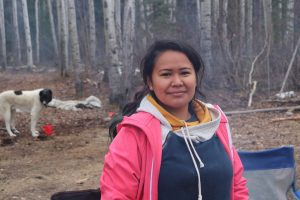
Vanessa Sanguez brought donations and supplies from Yellowknife to Jean Marie River First Nation. (Photo by Luke Carroll/ CKLB.)
They also created a rebuilding committee.
For those looking to donate, Chief Sanguez says funds are better than material items, as the money can go towards rebuilding.
But he added they can always use more personal hygiene items.
On Friday, his daughter Vanessa Sanguez drove a vehicle full of donations from Yellowknife to her hometown.
“We were able to get some toiletries and some snacks,” she explains.
Vanessa will be staying in Kelly Lake for a couple days with several other family members.
Kelly Lake, a refuge and a sacred place
Kelly Lake has alway been a sacred place to residents of Tthedzehk’edeli First Nation.
“There’s lots of people buried around here,” explains Richard Sanguez.
“We hold cultural camps and spring camps here,” says Jonas Sanguez.
The campsite was turned into a temporary home for about 10 displaced residents including Jonas, Richard and Villeneuve.
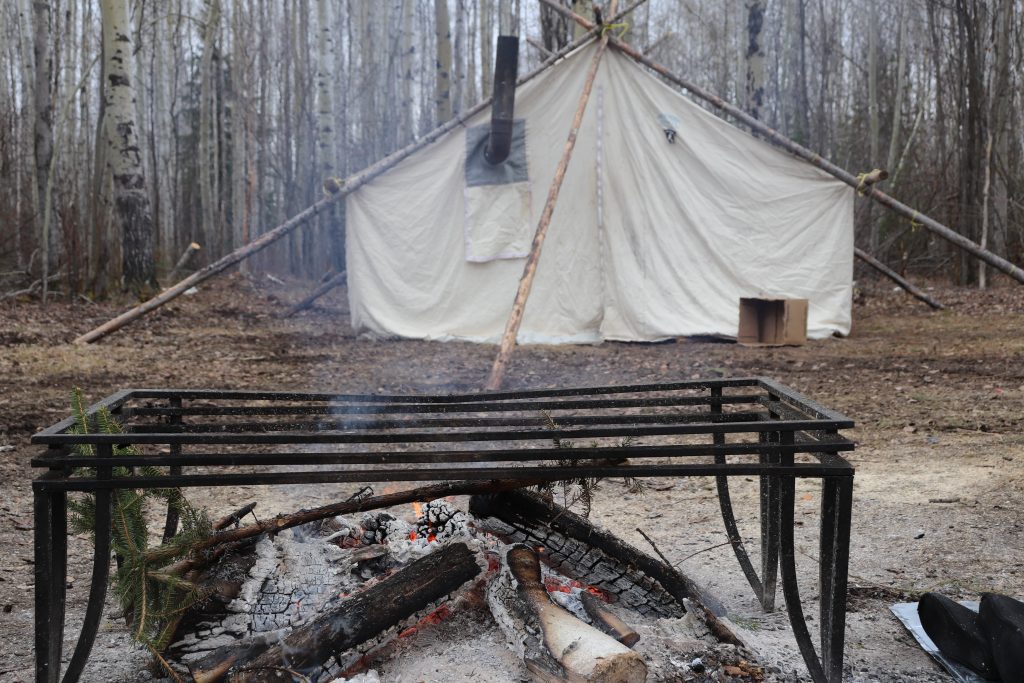
The firepit and one of the canvas tents at Kelly Lake. (Photo by Luke Carroll/ CKLB.)
Several canvas tents surround the campground, while a fire burns in the centre, boiling water or cooking food. Several dogs rest under the trees, ready to protect their owners.
“We’ve just had a few scares with black bears,” explains Jonas.
Jonas says he fears more flooding is on the way. He recounted the experience one week ago, when the river rose and it became a mad scramble to escape the community; some were trapped as the water cut off the road exit.
“We’d just rather stay out here until all the ice and water recedes,” he says.
“Everybody wants to get back in their homes but it’s pretty awful,” Richard says. “We’ve never had floods like this since 1963.”
- Jonas Sanguez sits by the fire on Thursday evening. He has now been at Kelly Lake for over a week. (Photo by Luke Carroll/ CKLB.)
- Richard Sanguez chops wood at Kelly Lake on Friday afternoon. (Photo by Luke Carroll/ CKLB.)
Richard says his house was on the high ground and had never flooded previously — until this year.
“Water went in the crawl space and… The wood got all damaged,” he says.
Jonas says he is “totally tired and burnt out” like many of his fellow community members.
“Where’s the beautiful weather?” he asks. “It’s just gloomy and cold.”
But he says he is relieved no one was hurt and there have been good moments including a delivery of KFC. And he does appreciate where he is staying.
“This is where our ancestors were brought up,” he says pointing to the trees and lake, “we’re born and raised on the land.”
Anyone looking to send funds to the residents of Jean Marie River First Nation can contact Medina Norwegian at admin@jmrfn.com.
Two online fundraisers have also been launched, one specifically for Jean Marie River, and another for both JMR and Fort Simpson.

